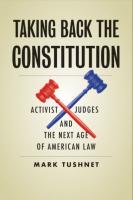Description
What Supreme Court justices do is far more than just "calling balls and strikes." The Court has never simply evaluated laws and arguments in light of permanent and immutable constitutional meanings. Social, moral, and yes, political ideas have always played into the justices' impressions of how they think a case should be decided. Mark Tushnet traces the ways constitutional thought has evolved, from the liberalism of the New Deal and the Great Society to the Reagan conservatism that has been dominant since the 1980s. Looking at the current crossroads in the constitutional order, Tushnet explores the possibilities of either a Trumpian entrenchment of the most extreme ideas of the Reagan philosophy, or a dramatic and destabilizing move to the left. Wary of either outcome, he offers a passionate and informed argument for replacing judicial supremacy with popular constitutionalism--a move that would restore to the other branches of government a role in deciding constitutional questions.
Product Details
- Yale University Press Brand
- Jul 14, 2020 Pub Date:
- 9780300245981 ISBN-13:
- 030024598X ISBN-10:
- 320 Pages
- English Language
- 8.5 in * 5.9 in * 1.2 in Dimensions:
- 1 lb Weight:




